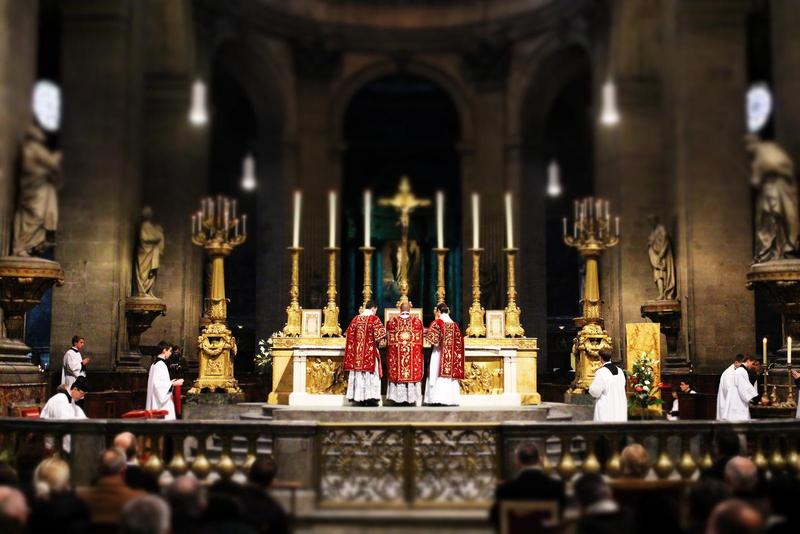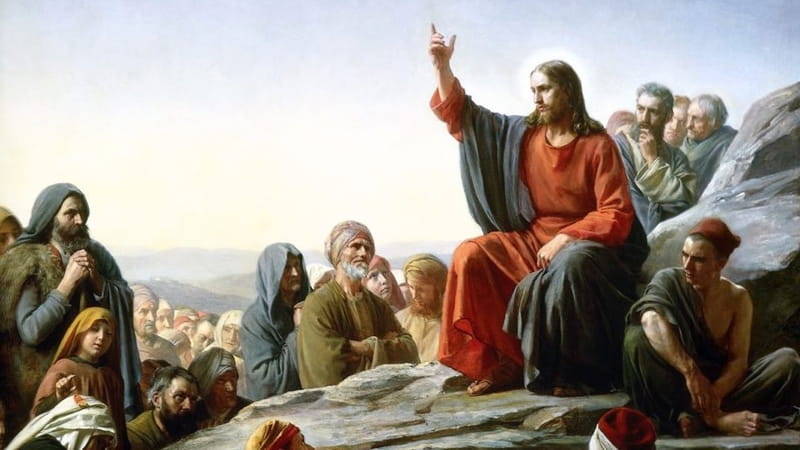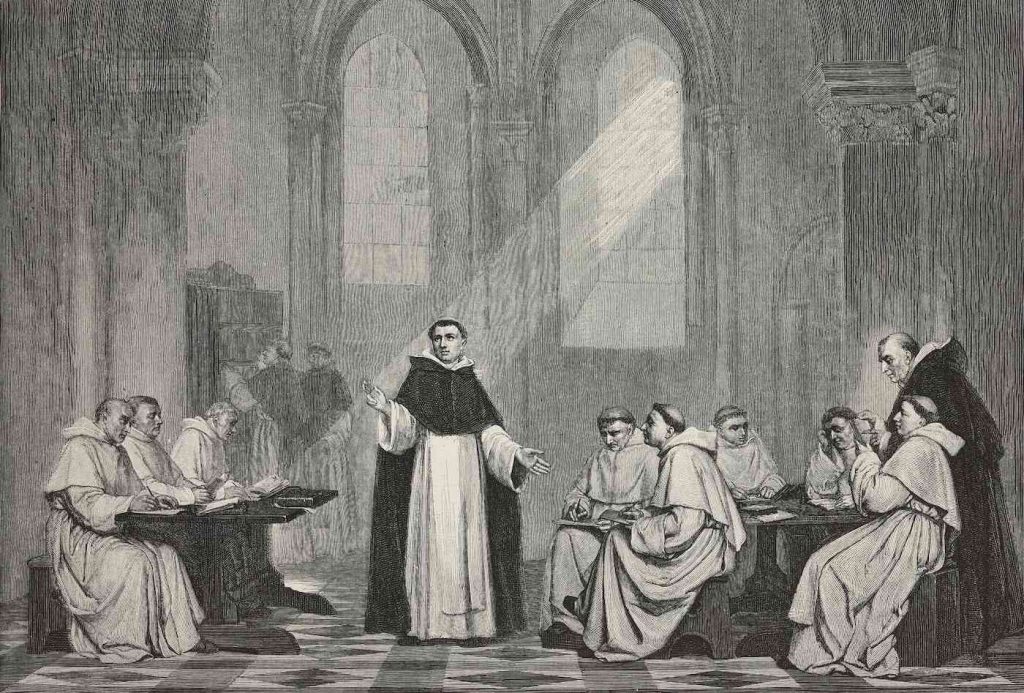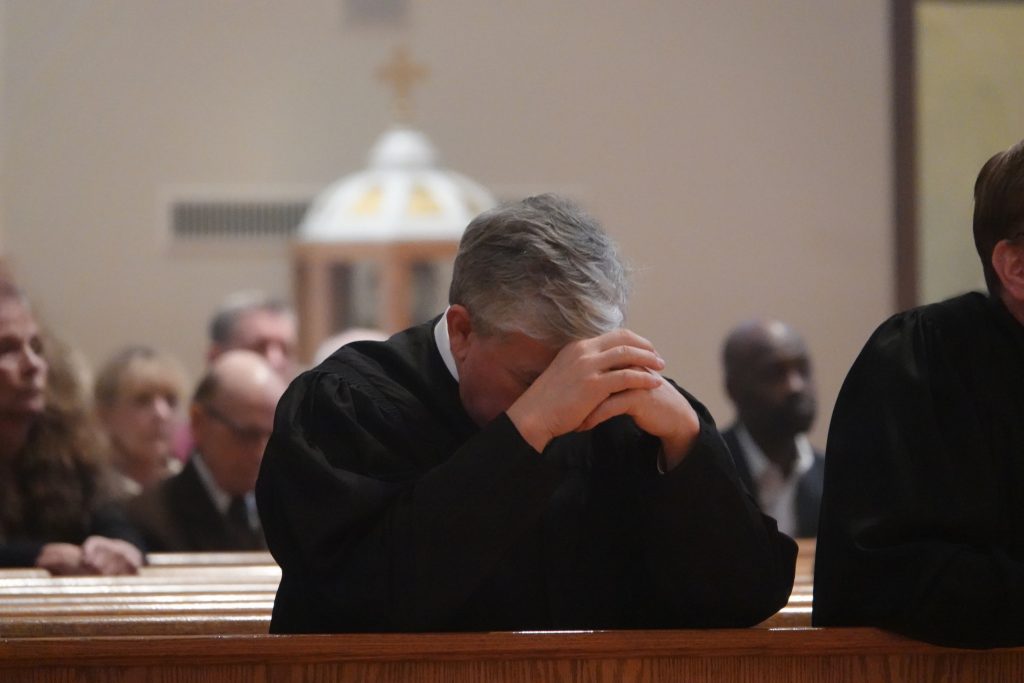
The Red Mass at St Mary’s Cathedral Sydney, and at St Patrick’s Cathedral Parramatta, are a reminder of a dialogue about law and justice which has been carried on since time immemorial, well before the Hebrew prophets, well before the Greek thinkers, Socrates, Plato and Aristotle, well before Jesus of Nazareth, well before modern jurisprudence. This continuing dialogue about law and justice draws on reason, but also on faith.
The Divine Liturgy at the Greek Orthodox Cathedral of the Annunciation Redfern; at St George’s Coptic Orthodox Church Kensington; the service at the Great Synagogue Elizabeth Street Sydney; and the service at the Guildford Mosque, are also very much part of this dialogue as to law and justice.
The various traditions have far more in common than may first seem. Each of these traditions recognises that reason, as opposed to mere will, is integral to law. Each of these traditions recognises that faith enlightens and enhances law. While these various traditions have somewhat different perspectives, they encourage an ongoing dialogue about law and justice which enhances 21st century Australia.
Alexis De Tocqueville
Alexis de Tocqueville (1805-59), following his visit to the United States in 1831, published Democracy in America, arguing in favour of democratic republicanism. Tocqueville argued for a balance of powers and an ordered liberty. He saw value in diversity of religious opinion. Tocqueville saw value in the distance of religion from specific political options. Tocqueville saw religious belief and practice as enhancing an understanding of equality before the law. Tocqueville saw religion as inculcating good habits, human virtues, including respect for law, helping democracy to flourish.
Tocqueville saw the understanding of a final judgment as enhancing the awareness of personal accountability, and the virtues necessary for democratic republicanism. Tocqueville’s favourable view in the 1830’s of religion and democracy in America has a perennial aspect that is relevant to 21st century Australia.

Questions One May Ask
Is it possible to be a lawyer, and yet fail to ask oneself questions such as:
- Are there actions which can reasonably be regarded as good? evil? right? wrong?
- What is human good?
- What is it to be reasonable? Can one speak of practical reasonableness?
- Are there principles of practical reasonableness? if so, what are they?
- What is it to be a person?
- Is there such a thing as human dignity? What does human dignity mean in practical terms?
- Is there such a thing as human nature? Is human nature a guide to human good, to what is to be done and pursued?
- Should one simply suit oneself? or have regard to others?
- Should one follow one’s conscience? What does that mean?
- Are there exceptionless moral norms, things one should never do? Does the end justify the means?
- Is there a common good? What does this mean?
- What is justice? What is justice between persons? In the distribution of goods? As regards the good of the community?
- What are rights? Are there absolute rights?
- What are duties? What is the relation between duties and rights?
- What is authority? Do those who are in authority have any obligations?
- What is leadership? In what does leadership consist?
- What is law? Should one obey the law? Are there circumstances when one should disobey the law?
- Can one conceive of law as a self-contained system without regard to ethics?
- Are there limits to law? What is law without equity? Without mercy?
- What is the purpose of punishment? Can punishment be just?
- Is there a right to a fair trial? In what does a fair trial consist?
- What is the rule of law? In what does the rule of law consist?
- What is the meaning of obligation? In what does obligation consist?
- Are there unjust laws? What is an unjust law? How should one respond to an unjust law?
- Is there such a thing as human dignity? In what does human dignity consist?
- Why do bad things happen to good people? How does one understand suffering?
- Is there an overarching explanation of human existence? In what does such explanation consist?
Inevitability of Answers
Few of us will readily be able to provide comprehensive and fully reasoned answers to such questions. Yet all of us, by the way we live our lives as lawyers, indeed as human beings, provide at least implicit answers to such questions. We cannot but answer these questions by the way we live over a lifetime. The answers we give to these questions make for human happiness, or otherwise, both for ourselves, and for those with whom we deal.
Dialogue
If we are honest with ourselves, we realise that we have neither the time, nor the capacity, to provide fully satisfactory explicit answers to these questions. Hence the desirability of entering into dialogue with those who have gone before, who have sought to explicitly answer these questions. The great thinkers – Confucius, Socrates, Plato, Aristotle, the Stoics, Cicero, St Augustine, Al Farabi, Moses Maimonides, Niccolo Machiavelli, John Calvin, Thomas Hobbes, John Locke, David Hume, Renee Descartes, Jean-Jacques Rousseau, Immanuel Kant, John Stuart Mill, Karl Marx, Friedrich Nietzsche, Jacques Maritain, Mortimer J Adler, the Australian legal philosopher John Finnis – have much to teach us. Even when they did not get it right, or, as almost always the case, did not get it entirely right, they have much to teach us. For even the mistakes of others can assist us as we attempt to respond, considering where a thinker is wrong, and why.
Great Writers on Law and Justice
The tension between law and justice is discussed in the works of the great writers on law and justice, not all of them lawyers, such as Solon, Sophocles (for instance, in Antigone), Justinian, Richard Hooker, William Shakespeare (The Merchant of Venice, Measure for Measure, and The Winter’s Tale), Francisco de Vitoria, Francisco Suarez, Montesquieu, Hugo Grotius, Sir William Blackstone, James Madison, Alexander Hamilton, John Jay, Jeremy Bentham, Harriet Beecher Stowe (Uncle Tom’s Cabin), Mark Twain (Huckleberry Finn), Charles Dickens (Bleak House), Fyodor Dostoyevsky, Franz Kafka (The Trial), the historian Harold Berman, Mahatma Gandhi, Martin Luther King, the authors of the Universal Declaration of Human Rights, Aleksandr Solzhenitsyn.
Faith
Faith is important for any area of knowledge, even human knowledge. Most of what we accept is passed on to us by others. We almost never discover the important things ourselves. We almost always rely in any field of intellectual activity on others. Even if we ourselves expand human knowledge, we do so in small ways, incrementally.
Insofar as the answers to the great questions of human life are provided by God – by Christ and by his Church – faith is a means by which we can come to the truth.
Even from a human perspective – the Ten Commandments, the teaching of the Hebrew prophets on social justice, the wisdom writings, the Sermon on the Mount, the parable of the Good Samaritan, Pope John XXIII’s Pacem in Terris, Pope John Paul II’s Veritatis Splendor – have much to say, no matter who one is, or what one’s perspective.
Many of the concepts we routinely use in law have a philosophical or even theological origin: agency, intent, foreseeability, knowledge, causation, negligence, person, voluntary assumption, mens rea, actus reus, justice, equity, judgment, unconscionability, mercy, restitution, rights, responsibility.
Human Fallibility
If we have the slightest insight, we realise that we can be wrong, that our perspective can be narrow or insufficient, that we can be blind, that others can see in what we say, and in what we do, the “bleeding obvious”, obvious to everyone but ourselves! The tale of The Emperor with No Clothes is illustrative of the great human capacity for self-deception. We can be misled by our superior communication skills, both in speech, and in writing, to think that we know, when, in fact, we know little! We need to be challenged to overcome our errors, our narrowness, our parochialism, our insularity!
Consistency
We need to examine our conscience to see whether there is inconsistency in our conduct between our understanding of what we should do, and what we actually do. We need to examine our conscience to know whether it is erroneous, or astray, or simply slack.
Slavery in the United States
If one considers the history of the United States, despite its great achievements, despite its great lawyers, despite its great legal institutions, the shadow of slavery has hung low, and continues to hang low to this day. Some of the greatest lawyers in the United States, some of the greatest statesmen in the United States, were slave-owners, or insufficiently aware of the evil of slavery. Institutions such as the Supreme Court have sometimes failed to recognise the evil of slavery, and, at other times, accepted slavery holus bolus. No better example of an “equivocator” as regards slavery is one of America’s greatest Presidents, Abraham Lincoln. England only abolished the slave trade in 1833.

Charles C Wu
The Chinese legal scholar, Charles C Wu, sees Jesus of Nazareth as the epitome of law. To some, Jesus of Nazareth is an opponent of law and lawyers. Yet Jesus of Nazareth is, as is evident from the Sermon on the Mount, the great law-giver, foreshadowed by Moses, but bringing the Mosaic law to perfection, enhancing the Mosaic law with his emphasis on human intention, mercy, forgiveness; sincerity; enhancing the Mosaic law by the law of love. Wu provides a series of examples, illustrating just how law-abiding Jesus of Nazareth was.
Does Our Law Judge a Person Without First Giving Him a Hearing?
In St John’s Gospel, in the context of the gathering antagonism between the chief priests and the pharisees, and Jesus of Nazareth, immediately prior to the account of the woman said to be caught in the act of adultery, Nicodemus says:
Does our law judge a man without first giving him a hearing and learning what he does?
This is a question that rings down the ages, a question that must be asked of lawyers everywhere, but particularly where persons are sentenced without trial, or following sham trials, or following, as is so common in Australia today, trial by media, sweeping away the presumption of innocence. This is a question which echoes the prescription of Deuteronomy in the Hebrew Bible:
On the evidence of two witnesses or of three witnesses he that is to die shall be put to death; a person shall not be put to death on the evidence of one witness.
Similarly, Nicodemus’ question is consistent with the Hebrew legal tradition to be found in Exodus.
You shall not utter a false report. You shall not join hands with a wicked man, to be a malicious witness. You shall not follow a multitude to do evil; nor shall you bear witness in a suit, turning aside after a multitude, so as to pervert justice; nor shall you be partial to a poor man in his suit.
Susanna
The Hebrew legal tradition is exemplified in the tale of Susanna, accused of adultery by the two elderly lecherous judges. The tale of Susanna is found in an appendix to Daniel in the Septuagint. Daniel asks:
Are you such fools, you sons of Israel? Have you condemned a daughter of Israel without examination and without learning the facts?
Susanna is innocent of wrong-doing but condemned by an act of rash judgment. This is a reminder to us that not every allegation is true, not every assertion to be believed, that one should be slow to condemn. Daniel separates the two witnesses, and requires that each give evidence individually. Daniel, whose name means “God is my judge”, elicits the truth by careful cross-examination, the complainants giving mutually inconsistent answers. The requirement of Deuteronomy that a finding of guilt involves at least two witnesses is not fulfilled as each complainant’s evidence is discredited. The evidence of each of the elders is considered carefully and found wanting. Each of the elders, carried away by evil intent, resorts to lying which Daniel unmasks. This is not the first occasion on which the elders have sinned against justice, Daniel commenting that the elders have previously abused their position to satisfy themselves, and that they have pronounced unjust judgments, condemning the innocent, letting the guilty go free.
Woman Caught in Act of Adultery
By contrast, the nameless woman said to be caught in the act of adultery, is used by the chief priests and the pharisees as bait to entice Jesus, to urge her death by stoning, as the Jewish law prescribed, in which case Jesus would fall foul of the Romans who did not permit the Jews to administer capital punishment. Alternatively, if Jesus was seen not to uphold the Jewish law, he would fall foul of the people who were devoted to the Jewish law.
But Jesus’ concern is for the good of the woman, urging her to go and not sin again. The chief priests and pharisees leave one by one, beginning with the eldest, in response to Jesus’ mysteriously writing with his finger on the ground. Whatever the meaning of this, Jesus’ concern is not a red-necked application of the law, so often urged by shock jocks, but to restore the woman, encouraging her to repentance and a good life. Law, from Jesus’ perspective, is for the person, not the person for law. This is the whole point of Jesus’ various controversies over healing on the Sabbath.

Defending an Unjust Cause
In St Thomas Aquinas’ Summa Theologiae we find the Treatises on Law, on Justice, and on Injustice. In the Treatise on Injustice St Thomas Aquinas, comments on the respective roles of the judge, witnesses and lawyers; on complaint; on conduct of a defence. Aquinas’ pithy discussions of these topics remains worth reading today.
Aquinas raises the issue of a lawyer who defends an unjust cause. Aquinas argues that it is not right for somebody to be an accomplice in wrong-doing, whether by advice or active help or consent of any sort, for an advisor and abettor are in effect doers. A lawyer, says Aquinas, gives both advice and help to the person he defends. Therefore, if he takes up a cause, knowing it is unjust, he commits a grave sin. If, on the other hand, he takes up the cause in ignorance, thinking that it is just, he is excused to the extent that ignorance excuses. A lawyer who thought that his cause was just when he took it up, but later discovers during the proceedings that it is unjust must not betray it in the sense of helping the other party or giving confidential information to him. He can and must, however, give up the cause, by persuading his client, either to concede the case, or settle it, without loss to the other party.
Obviously, one might write whole volumes on this, and its application in different circumstances. What makes Aquinas so important a thinker is that he sees the issue, and seeks to address it in a way that takes into account differing views, while upholding the principle that one must not co-operate in another’s wrong-doing.
Law and Christianity
The relationship between law and Christianity is a matter of serious academic consideration as illustrated by the Cambridge University Press The Law andChristianity series edited by John Witte Jr of Emory University. The Law and Christianity series brings together Catholic, Protestant and Orthodox scholars, writing on diverse topics including justice, freedom, love, conscience, human rights, natural law, marriage and family, immigration, market regulation, protection of the environment, international law, Catholic social teaching, great Christian jurists, church and state.
Equity
In the forthcoming Oxford Handbook of Christianity and Law, inter alia, Samuel L Bray and Paul B Miller consider equity as a concept which has been influenced by Christian sources, and in turn influenced by classical sources, especially Aristotle. The concept of equity has developed from Aristotle through Roman law, the Hebrew Bible, the New Testament, scholastic theology, canon law, the protestant reformation, the English Court of Chancery, to the present day.
One approach to equity sees it as an exceptional correction to the generality of law which may work harshly in particular circumstances (the exceptional sense). Aquinas, for instance, while acknowledging that goods should generally be returned to their rightful owner, sees equity as justifying the non-return of a sword to someone who is mentally ill.
Another approach sees equity as the justice that ought imbue law, and thus a guide to law’s interpretation(the interpretative sense). Thus statutory interpretation ought always seek an understanding of legislation which enhances respect for the human person, respect for human rights.
Regardless, equity is linked with justice, both as a political virtue, and as a personal virtue – an essential condition for a just society, a characteristic of a just person. The contemporary law of equity bears the imprint, however faint, both of its classical and its Christian sources.

Why the Red Mass?
If we attend and participate in the Red Mass, and if the celebrant addresses in his homily the needs of participants, we increase in understanding the big questions we face as lawyers, as human beings; and our practical response to such questions will be enhanced. We are encouraged to confront the questions, which, however big, we must answer in the course of our daily grind, our day-to-day practice as lawyers. We are encouraged in our struggle to live well our lives as lawyers, as human beings. For those who are believers, struggling to live the faith involves growing in the grace which enables us to live our calling as lawyers well.
Too Busy
Hence it is no small thing not to attend the Red Mass because we are “too busy”, or can’t be bothered. The Red Mass (and like services) is an acknowledgment that there is an overarching reality within which our work as lawyers, as human beings, is to be judged. The Red Mass is an acknowledgement that no matter who we are, no matter what our role, in our work as lawyers, we need wisdom, we need prudence, we need justice, we need virtues which we do not always demonstrate.
High Middle Ages
The Red Mass has been celebrated since the High Middle Ages, since the 13th century. The Red Mass is a manifestation of the tension between law and justice which has existed as long as human beings have existed.
The Red Mass is celebrated around the world, wherever Catholic lawyers live and work. In Washington, the capital of the United States, the Red Mass is celebrated on the Sunday before the first Monday in October at the Cathedral of St Matthew the Apostle. St Matthew is the patron of all who work in public service. The Red Mass is typically attended by the President of the United States, and the Chief Justice and Associate Justices of the Supreme Court, cabinet officials, members of Congress, diplomats, academics, lawyers, students. Liturgically, the Red Mass is celebrated as the Solemn Mass of the Holy Spirit. Its name derives from the traditional red colour of the vestments worn by the clergy during Mass, representing the tongues of fire symbolizing the presence of the Holy Spirit. The Red Mass in Washington is organised by the John Carroll Society, a Society which has much in common with Sydney’s St Thomas More Society.
In Sydney the Red Mass has been celebrated since 1931, even during the dark days of the Second World War. The Red Mass is an aspect of our response to age-old questions about law and justice, questions which recur as long as human life and human society continue, questions that never take time out.
Similar Ceremonies
Amongst adherents of other faiths, similar ceremonies occur, an acknowledgment of the different understandings of law and justice, however much such understandings have in common. The St Thomas MoreSociety promotes the services of other religious groups – in Sydney, Anglican, Orthodox, Coptic, Jewish, Muslim – acknowledging our respect and love for adherents of other faiths, acknowledging that more unites us than divides us.
Sometimes it is said there should be simply one ecumenical service at the commencement of the law term, often urging pragmatic reasons of time and convenience. But that is to disregard the rich but different traditions which will be forgotten or ignored if, for instance, there were no Muslim Service, no Jewish Service, no Orthodox Divine Liturgy.
The Commencement Services, including the Red Mass, are part of a continuing dialogue about law and justice, a dialogue which we cannot avoid, as lawyers, as human beings, a dialogue in which we participate, in our daily work as lawyers, in our life as persons, in our family life, as members of the community, in our relation with all those with whom we come in contact. As lawyers, as human beings, there is no avoiding a personal response to the great questions as to law and justice.
Michael McAuley
14 January 2023
